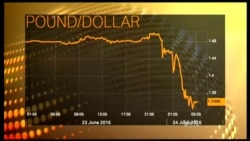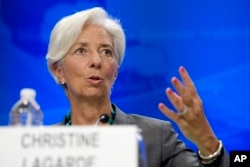ລາຄາຮຸ້ນຢູ່ໃນຕະຫລາດທົ່ວໂລກ ໄດ້ຕົກຮວບລົງຢ່າງຫລວງຫຼາຍ ລາຄານ້ຳມັນກໍຫລຸດລົງ ແລະຄ່າຂອງເງິນປອນອັງກິດ ກໍໄດ້ຕົກສູ່ລະດັບຕ່ຳສຸດ ໃນຮອບສາມທົດສະວັດ ຫຼັງຈາກໄດ້ມີການປ່ອນບັດລົງຄະແນນສຽງແບບທີ່ບໍ່ເຄີຍມີມາກ່ອນໃຫ້ອັງກິດຖອນໂຕອອກຈາກສະຫະພາບຢູໂຣບ. ພວກນັກລົງທຶນທີ່ເປັນຫ່ວງໄດ້ນຳເອົາເງິນຂອງພວກເຂົາເຈົ້າໄປໄວ້ຢູ່ໃນບ່ອນທີ່ປອດໄພ ໂດຍພາກັນຊື້ຄຳແລະພັນທະບັດຂອງລັດຖະບານຈຳນວນນຶ່ງ.
ດັດຊະນີຮຸ້ນທີ່ສຳຄັນໆຂອງສະຫະລັດ ໄດ້ຕົກລາຄາ 3.3 ເປີເຊັນຫລືຫຼາຍກວ່ານັ້ນໃນການຊື້ຂາຍໃນວັນສຸກວານນີ້. ຕະຫລາດຮຸ້ນຢູ່ຢູໂຣບກໍຕົກລາຄາເຊັ່ນດຽວກັນ ໂດຍທີ່ດັດຊະນີຮຸ້ນສຳຄັນໆໃນນະຄອນລອນດອນໄດ້ຕົກລາຄາ 3 ເປີເຊັນຂະນະທີ່ຮຸ້ນຢູ່ຝຣັ່ງ ຕົກລາຄາ 8 ເປີເຊັນ. ອົງການຂ່າວດ້ານການເງິນ Bloomberg ກະປະມານວ່າ ຮຸ້ນຢູ່ ເຂດເອເຊຍ ໄດ້ຮັບຄວາມເສຍຫາຍ 700 ຕື້ໂດລາໃນການຊື້ຂາຍໃນວັນສຸກວານນີ້. ຮຸ້ນຢູ່ຍີ່ປຸ່ນໄດ້ຕົກລາຄາຢ່າງໃຫຍ່ ຈົນເຈົ້າໜ້າທີ່ສັ່ງໃຫ້ຢຸດການຊື້ຂາຍເປັນເວລາສັ້ນໆ ເພື່ອເຮັດໃຫ້ສະຖານະການດີຂຶ້ນ.
ບັນດາອົງການຈັດລະດັບສິນເຊື່ອທີ່ສຳຄັນກ່າວວ່າ ການຖອນໂຕອອກຈາກສະຫະພາບ ຢູໂຣບຈະສ້າງຄວາມເສຍຫາຍໃຫ້ແກ່ເສດຖະກິດຂອງອັງກິດ. ອົງການ Moody ກ່າວວ່າ ການປ່ອນບັດໄດ້ໃຫ້ສັນຍານກ່ຽວກັບສະພາບທີ່ບໍ່ແນ່ນອນເປັນເວລາດົນນານ ທີ່ຈະມີອິດທິພົນຕໍ່ການສະແດງອອກຊຶ່ງສະມັດຖະພາບທາງດ້ານເສດຖະກິດແລະການເງິນຂອງອັງ ກິດ. ອົງການ S&P ກ່າວວ່າອັດຕາສິນເຊື່ອຂອງອັງກິດອາດຈະຫຼຸດຕ່ຳລົງ. ສ່ວນອົງການ Fitch ເອີ້ນການປ່ອນບັດນີ້ວ່າ ມີຜົນໃນທາງລົບຕໍ່ສິນເຊື່ອ.
ສາສະດາຈານສອນວິຊາກົດໝາຍ ຢູ່ມະຫາວິທະຍາໄລ Harvard ທ່ານ Hal Scott ຊຶ່ງໄດ້ສຶກສາກ່ຽວກັບລະບົບນາໆຊາດກ່າວວ່າ ພື້ນຖານຂອງເສດຖະກິດໄດ້ປ່ຽນແປງໄປສຳ ລັບອັງກິດ ແຕ່ກໍບໍ່ພຽງພໍ ທີ່ຈະພາໃຫ້ເກີດ ສະພາບເສດຖະກິດຕົກຕ່ຳ ນອກຈາກວ່າ ຈະເກີດການຕື່ນຕົກໃຈທີ່ບໍ່ມີເຫດຜົນຂຶ້ນ. ທ່ານທຳນາຍວ່າ ສະພາບຄວາມວຸ້ນວາຍທາງດ້ານເສດຖະກິດໃນປັດຈຸບັນນີ້ ຈະດຳເນີນຕໍ່ໄປຊົ່ວໄລຍະນຶ່ງເທົ່ານັ້ນ.
ຫົວໜ້າຂອງອົງການກອງທຶນສາກົນທ່ານນາງ Christine Lagarde ຮຽກຮ້ອງໃຫ້ອັງກິດແລະຢູໂຣບເປີດການເຈລະຈາ ກ່ຽວກັບຄວາມສຳພັນທາງດ້ານເສດຖະກິດໃໝ່ ເພື່ອໃຫ້ເກີດຄວາມລາບລື່ນຫຼາຍເທົ່າທີ່ເປັນໄປໄດ້.
Global stock markets dropped sharply, oil prices fell and the value of the British currency plunged to a three-decade low Friday after the unprecedented vote for Britain to leave the European Union. Worried investors sought safe havens for their money, buying up gold and certain government bonds.
Key U.S. stock indexes were down 3.3 percent or more in Friday's trading. European markets also fell, with London's key index off 3 percent and France's plunging 8 percent.
The Bloomberg financial news service estimated that Asian stocks lost $700 billion during Friday's trading. Japan's stock market fell so sharply that officials stopped trading for a brief time to calm things down.
The major credit rating agencies said Brexit would hurt Britain's economy. Moody's said the vote signaled a long period of "uncertainty" that would "weigh on Britain's economic and financial performance." S&P said Britain's credit rating might be downgraded. Fitch called the vote "credit negative."
Harvard law professor Hal Scott, who researches international systems, said the economic fundamentals had changed for Britain, but not enough to spark a recession unless there is an "irrational" panic. He predicted that the current market turmoil would go on for "a while."
The head of the International Monetary Fund, Christine Lagarde, urged Britain and Europe to negotiate a new economic relationship in as "smooth a manner as possible." She said the IMF welcomed measures announced by the British and European central banks to ensure banks can continue to make loans.
Uncertainty worries lenders and investors, who tend to stop making loans during times of crisis, which can further slow the economy and worsen the problem. The Bank of England has set aside $342 billion to help provide "liquidity" to keep markets running.
U.S. Treasury Secretary Jack Lew said policymakers have the tools necessary to "support financial stability," which is important to economic growth. World Bank President Jim Yong Kim said his agency was ready to support member countries.
Japanese Finance Minister Taro Aso told reporters Japan was closely watching the "extremely nervous" foreign currency markets, while South Korea’s government pledged to "take all necessary measures" to soothe the foreign exchange market.
So far, the biggest victim from the vote appeared to be the pound, which dropped in value from $1.50 to around $1.34 at one point.
The lower value of the British currency will make imported goods more expensive there, which could boost inflation. But the cheaper currency also means British-made goods will be less expensive abroad, and thus easier to sell on global markets and boost British exports.






